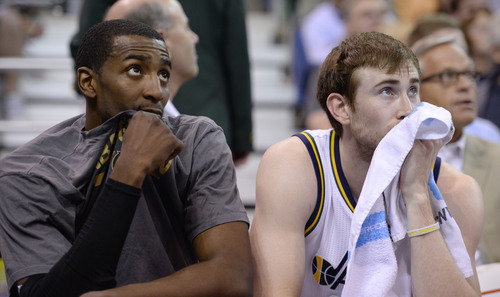This is an archived article that was published on sltrib.com in 2014, and information in the article may be outdated. It is provided only for personal research purposes and may not be reprinted.
As only a neighboring pro sports owner could, Dick Monfort understands what the Jazz are going through.
Well, the phenomenon of fans being happy about the Jazz's losing mystified him, as he watched Monday's game at EnergySolutions Arena. But having a management strategy and believing in it, through the ups and downs? That part, Monfort gets.
Asked what he's learned in 17 years of baseball, the Colorado Rockies chairman said, "Patience."
That's what he keeps reminding himself, anyway. And that word shouldn't be misinterpreted as an expression of not caring enough about winning.
As he spoke Tuesday during his annual marketing visit to Salt Lake City, Monfort was reeling from the events of the previous night, when his team lost an eighth-inning lead at San Diego without allowing a hit. He's been criticized for the enhancements of Coors Field by those who believe the Rockies' management is more concerned about driving attendance than improving the on-field product. In that sense, listening to Monfort's replay of the Rockies' game would have been reassuring to any fan of the team.
Monfort clearly is hurt when the Rockies lose. The Jazz's case is somewhat different, because of what the franchise stands to gain from a poor record this season. But personally, I would be comforted in knowing that Jazz management has suffered as much as Monfort in defeat.
The nature of player development in baseball and the immediate impact of the draft in basketball distinguish the sports. Yet the Jazz's approach is similar to the Rockies' method of producing homegrown players and filling in around them, so there's some connection between these franchises, beyond sharing the Utah television market.
The Rockies finished 64-98 in 2012, roughly the baseball equivalent of 24 wins in the NBA. They had enough credibility from a 2007 World Series appearance to withstand a downturn and have fans believe in their ability to rebuild. That's pretty much where the Jazz are right now, although their tearing-down process was intentional.
Denver is a mid-sized market, and the Rockies' franchise-high $95 million payroll ranks in the middle tier of Major League Baseball. That figure is dwarfed by the salaries of two of Colorado's National League West rivals, the Los Angeles Dodgers ($235 million) and San Francisco Giants ($154 million).
Monfort points to the American League success of Oakland and Tampa Bay as proof that low-payroll teams can compete in baseball. Colorado has two stars, left fielder Carlos Gonzalez and shortstop Troy Tulowitzki, and a strong minor-league system.
The Rockies have been very inconsistent, for various reasons. Beginning in '07, their season win totals are 90, 74, 92, 83, 73, 64 and 74. Monfort believes they can maintain an upward trend now, and that's what the Jazz intend to do — now that they've established such a low baseline.
Which brings us to the weird ending of the Jazz's season, and the anticipation of what's ahead. From his own drafting experience, Monfort wanted to know how much difference it could make for the Jazz to finish one or two spots higher or lower in the standings, pending the lottery. Maybe there is a significant dropoff point in this draft class, but who really knows?
Because of their poor record in 2012, the Rockies picked No. 3 in last June's draft. They chose pitcher Jon Gray (who's now at Double-A Tulsa), and Monfort said they had him ranked No. 2 — just ahead of infielder Kris Bryant, who had gone to the Chicago Cubs.
That example of varying evaluation is what made Monfort wonder why Jazz fans are so obsessed with the draft order. Of course, he's just a baseball guy.
Twitter: @tribkurt



